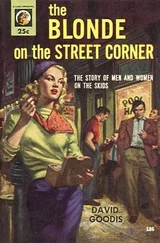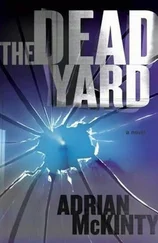I went to bed with Doctor Faustus and its powerful soporific qualities became readily apparent.
14: A VERY ORDINARY ASSASSINATION
The clock radio woke me at 7.06. I’d been fiddling with the alarm for several days now and I had precisely timed it for when the news bulletin ended and BBC Radio One would only be playing music. These days only a madman would want to wake to the actual news. The Beeb could be relied upon to do things on schedule. The talk and the bulletin were indeed over and the song was “Hanging on the Telephone” by Blondie.
I listened to the song, had a quick Debbie Harry fantasy, and got of bed.
Stairs. Kitchen.
Doorbell. It was a tinker disguised in drink, offering to pave my driveway for twenty quid. When I told him I didn’t have a driveway he said he’d fix my broken electrical appliances or recite a verse from the Tain for a shilling. I let him recite me some poetry and gave him fifty pence if promised not to tell his mates I was a soft touch.
After toast and two cups of coffee I finally put on the eight o’clock Radio Ulster News. The policeman’s murder was not the headline. It was only the fourth lead after three separate stories about the Task Force’s adventures in the Falkland Islands. Some wars, it seemed, were more important than others.
“In Ballygalley, north of Larne, a full-time RUC officer was shot dead outside his home late last night. Inspector David Dougherty, fifty-nine, was divorced with one child. The Provisional IRA claimed responsibility for the attack in a phone call to the BBC using a recognised code word. Ian Paisley, the MP for the constituency, called Inspector Dougherty’s murder ‘a reprehensible act of murder in the continuing IRA campaign of genocide against the Protestant people’. The Inspector’s widow could not last night be reached for comment. In other news Harland and Wolff shipyard have laid off a further five hundred welders under a restructuring—”
There could only be one Inspector David Dougherty at Larne RUC.
I switched off the radio, went back upstairs, got dressed in my black polo neck sweater, black jeans, DM shoes, black raincoat. I put my leather shoulder holster under the raincoat, picked up my Smith and Wesson and checked that there were six rounds in the barrel.
“Right,” I said, and slipped outside.
I looked under the car for a mercury tilt bomb, found nothing, opened the door, wound down the windows, put the key in the ignition.
There was a whoosh through the vents which, for a brief unhappy moment, I thought was the percussion wave of an explosion, but it was just a whoosh of cold air.
At that moment the black woman I had seen before came out of the vacant house at the end of Coronation Road. She was wearing a purple dress with a red trim. Carrickfergus women didn’t wear purple dresses. And again, for another half a beat, I wondered if I hadn’t in fact just been killed in an explosion.
The engine turned over and the BMW roared into life.
I let out the hand brake, engaged the clutch and drove past her. She looked at me through the windscreen. I nodded a good morning. She smiled. She was very thin and very good-looking – the women on Coronation Road would no doubt begin spreading rumours about her immediately. Was she a student? A refugee? If so, God help her that she had ended up in Northern Ireland.
I was in the mood for no more news so I put on Radio Three and endured Brahms for ten minutes before switching off the radio and listening to nothing but the German-engineered pistons going about their efficient business.
Ballygalley was fifteen miles up the coast, just beyond Larne.
Nice little place with a castle, a beach, a caravan park and a couple of shops. Dougherty’s house wasn’t hard to find. The one with all the police Land Rovers and the van from the BBC outside.
It was a bungalow on a little rise at the end of a cul-de-sac.
I parked down the street, flashed my warrant card to the reserve constables protecting the crime scene and found the detective in charge, Chief Inspector Tony McIlroy, who was an old mate from my days in Bandit Country on the South Armagh border.
Tony was one of the lead detectives in the RUC Assassination Unit which investigated all police murders in Northern Ireland. The RUCAU looked for similarities, common weapons, common strategies etc. in crimes against coppers. We took it personally when the terrorists killed one of our own and it wasn’t unfair to say that the murder of a peeler attracted more money and resources than other murders in the Province. The miserable clearance rate, of course, was about the same: less than ten per cent. Unless the terrorists made a mistake or someone grassed very few of these murders ever resulted in a prosecution (although quite often we would find out who the trigger man on a particular hit had been).
Tony had a degree in criminology from Birmingham University, a wife who was the daughter of a Conservative English MP, a father who was a prominent Belfast barrister, and he had spent a year on secondment to the Met. He was a high-flyer even back then in South Armagh when he’d been a lowly detective sergeant and I a freshly minted DC. Tony would be a chief superintendent by the age of forty and probably chief constable by fifty (chief constable of a force over the water that is, for Northern Ireland was too small a place to contain his ambitions forever).
He shook my hand. “What’s the good word, Sean, me old mucker?”
“Tony, everybody knows that the bird is the word.”
“They do indeed. What have you been up to, Sean?”
“The usual. I’ve got a play opening in the West End, oh, and fingers crossed, I think I’ve just discovered a tenth planet. Gonna name it after me mum. You look good, Tony, wee bit tubby, but who isn’t,” I said.
“You look as if you’re on the heroin diet. And grey hairs? Must be your guilty conscience, Sean, my lad.”
“Grey hairs from hard work, mate.”
He leaned in. “Hey, seriously, congratulations on the medal and the promotion,” he said, with genuine affection.
“Cheers, mate,” I replied with equal amounts of fondness.
He was pale-skinned, and some of that famous shock of red hair was also greying at the temple, but he looked fit, focused, professional. He had acquired rectangular glasses that gave him a professorial air.
“What brings you out here, Sean?”
“I knew Dougherty a little bit. What can you tell me about this business?”
Tony shook his head and took a cigarette from my packet of Marlboros.
“Standard stuff, Sean.”
“Nothing special about it?”
“Nah. Your common or garden IRA hit. Two shooters probably. Or one shooter, one driver. Parked outside his house, a little ways down the street, waited until our boy got home. Popped him as soon as he exited his car. Pretty soft target living here at the end of the cul-de-sac.”
“A bead on the shooters?”
“If I had to guess I’d say it was the West Belfast Brigade, probably a team under Jimmy Doogan Reilly.”
“Pretty adventurous for them to come way up here, no?”
“Nah, they’re always looking to expanding their op zones and if you hoofed it you could be back in Belfast in half an hour.”
“Definitely IRA then?”
“Well, not definitely, but almost certainly.”
Almost every peeler who was murdered in Northern Ireland was murdered by the IRA, usually in one of three methods: a mercury tilt bomb under their car, an ambush by an IRA assassination cell, or in a mass bomb attack on a police station.
“If you’ve got the time, you couldn’t lead me through the physical evidence?”
Tony looked at me askance. “Was this a really good mate of yours or something?”
Читать дальше










